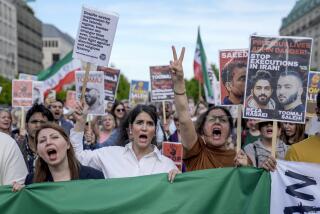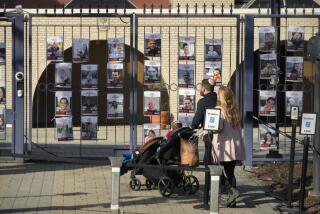Iranian Who Set Himself Afire in Protest Hailed by Exiles as Martyr
- Share via
Neusha Farrahi, an Iranian man of letters who set himself afire Sept. 20 to protest the executions and human rights abuses under the Ayatollah Ruhollah Khomeini’s regime since 1979, is being hailed by many Iranian exiles here and around the world as a martyr.
He died Friday, 12 days after he set himself afire during a Westwood protest. He was 31.
An intellectual of strong leftist politics, Farrahi’s action shocked many of the estimated 200,000 to 400,000 exiles here. Many praised his courage. Some other anti-Khomeini exiles who supported the government of the late Shah Mohammed Reza Pahlavi criticized him as a “showoff” and suggested that his act was not a serious protest.
But special broadcasts and publications of the variety of Farsi-language media here late Friday and Saturday indicated that the highly fragmented community was beginning to rally around the young man’s act.
‘Name Is Becoming Symbolic’
“This was such a strong step, imagine, to kill yourself for what you believe, that his name is becoming symbolic for all of those who are against the Khomeini regime,” said Ali Limonadi, producer of a program that is broadcast in Farsi on Channel 18.
Limonadi, like many Iranians here, said he opposed Farrahi’s leftist politics but was deeply touched by his sacrifice. “This act will give new energy to the Iranian community,” he predicted.
Farrahi’s father, Farhang, a renowned Iranian journalist who himself opposed his son’s leftist politics, published a special edition of the weekly paper he edits here Saturday. The edition included pictures of his son’s self-immolation and quotes from sympathizers throughout the country. Some, he said, had called from inside Iran, where they reported hearing the news on Voice of America.
“While I feel profound agony, the fact that my son was able to express the people’s anger and abhorrence at this government of gallows calms my turbulent soul,” the elder Farrahi said through a translator Saturday. “He paid this high price for freedom. Iranians are paying a high price for freedom.”
Vigil Scheduled
A vigil was scheduled to be conducted in commemoration of Farrahi this afternoon at the Federal Building. Organizers said those attending were expected to carry red roses, a symbol of life, to commemorate the death of Farrahi and the 6,000 Iranians known to have been executed under Khomeini.
It was at the Federal Building where Farrahi stood up Sept. 20, shouted brief slogans in English against the Shah and Khomeini’s Islamic Republic, and set himself on fire.
The fire was extinguished within about a minute by his younger brother, Payam, who found a fire extinguisher wrapped in a blanket nearby. “If he had only told me about the fire extinguisher,” Payam said shortly after the demonstration, “I could have stopped him from being so badly burned. But if he had told me, then how could I have let him do it?”
Farrahi was hospitalized with burns over 70% of his body.
Shocked and Puzzled
The move puzzled, as well as shocked, many Iranians because self-immolation is not in the Persian tradition. Moreover, Farrahi was a declared atheist who reviled the notion of shahid , an Islamic tradition of self-sacrifice that is now being used by Khomeini to send thousands of boys into war against Iraq with promises of rewards in an afterlife if they should die in battle.
Farrahi was an art and film critic in the Farsi-language media. He ran a bookstore in Westwood that has been a gathering place for anti-Khomeini Iranians.
Surviving are his father, his mother, Galoria, and two brothers, Nima and Payam.
Funeral arrangements have yet to be decided.
More to Read
Sign up for Essential California
The most important California stories and recommendations in your inbox every morning.
You may occasionally receive promotional content from the Los Angeles Times.













